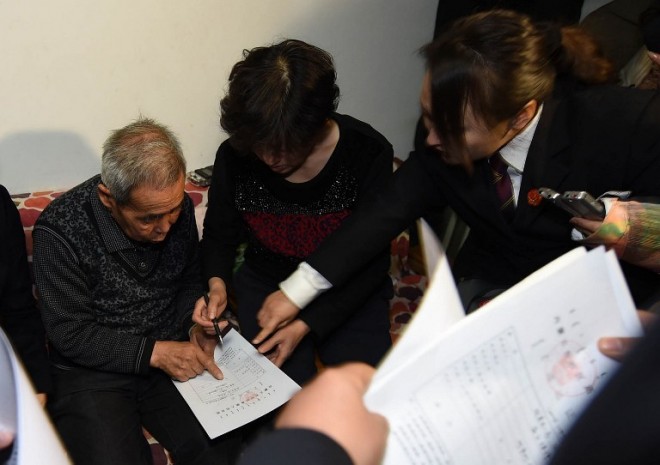Torture ‘deeply entrenched’ in China justice system — UN watchdog

The judge of the higher people’s court delivers retrial files to the parents of a Chinese teenager wrongly convicted and executed for murder and rape 18 years ago. The 18-year-old, named Hugjiltu and also known as Qoysiletu, was found guilty and put to death in Inner Mongolia in 1996, but doubt was cast on the verdict when another man confessed to the crime in 2005. AFP FILE
GENEVA, Switzerland — A UN watchdog on Wednesday urged China to end the rampant use of torture in its prisons, close all “black jails” and halt a large-scale crackdown on lawyers and activists.
The UN Committee Against Torture also voiced alarm over deaths in custody and a lack of accountability for perpetrators of abuse.
The 10-member committee, which periodically reviews the records of the 156 countries that have ratified an international convention against torture, issued its report after questioning a large Chinese delegation about the country’s record last month.
The investigators had praise for some changes in the law, including a 2012 amendment that bars the use of confessions extracted by torture as evidence in criminal proceedings.
George Tugushi, one of the panel’s top investigators, however told reporters that “sometimes there is a distance between theory and practice.”
“The committee remains seriously concerned over consistent reports indicating that the practice of torture and ill-treatment is still deeply entrenched in the criminal justice system, which overly relies on confessions as the basis for convictions,” the report said.
A report by Amnesty International last month detailed how suspects received electric shocks, were punched, kicked, hit with shoes or bottles filled with water, denied sleep and locked in iron chairs forcing them into painful postures for hours on end.
Interrogation chairs
While some of these practices are banned by laxly implemented laws, others are sanctioned, the committee noted.
Jens Modvig, another top committee investigator, voiced particular concern over the use of so-called interrogation chairs, which the Chinese delegation insisted were needed to keep detainees from escaping or injuring themselves or their interrogators.
He said during last month’s hearing that “in a detention place there (should be) no need for restraints.”
“There are no time limits to how long such an interrogation can take place, which in itself probably amounts to ill-treatment and could easily amount to torture,” he said, adding: “This is a sanctioned method of interrogation which is used everywhere.”
The committee also voiced alarm over China’s alleged use of so-called black jails, or secret detention facilities — something China’s delegation denied.
The committee voiced particular concern over a recent law change allowing a person to be held under “residential surveillance at a designated location” for up to six months, noting that these locations were often kept secret.
This, it said, may place detainees “at a high risk of torture and ill-treatment.”
“This is in fact legitimizing secret detention,” Modvig said.
The report also warned that suspects in many cases lack adequate access to lawyers, insisting that suspects should be held for no more than 48 hours before talking to an attorney, instead of the currently permitted 37 days.
And it voiced alarm over “escalating abuses” targeting lawyers themselves.
The report said more than 200 lawyers and activists had been rounded up in an “unprecedented” crackdown since July, and that 25 reportedly remain under residential surveillance and four are allegedly unaccounted for.
The committee has given Beijing a year to detail progress towards complying with the Convention Against Torture.